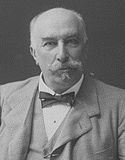Italian general election, 1892
|
|
|||||||||||||||||||||||||||||||||
|---|---|---|---|---|---|---|---|---|---|---|---|---|---|---|---|---|---|---|---|---|---|---|---|---|---|---|---|---|---|---|---|---|---|
|
|||||||||||||||||||||||||||||||||
|
All 508 seats to the Chamber of Deputies of the Kingdom of Italy |
|||||||||||||||||||||||||||||||||
|
|||||||||||||||||||||||||||||||||
|
|||||||||||||||||||||||||||||||||
Antonio Starabba, Marchese di Rudinì
Historical Right
Giovanni Giolitti
Historical Left
General elections were held in Italy on 6 November 1892, with a second round of voting on 13 November. The "ministerial" left-wing bloc emerged as the largest in Parliament, winning 323 of the 508 seats. The electoral system reverted to the pre-1882 method of using single-member constituencies with second round run-offs.
Giovanni Giolitti's first term as Prime Minister (1892–1893) was marked by misfortune and misgovernment. The building crisis and the commercial rupture with France had impaired the situation of the state banks, of which one, the Banca Romana, had been further undermined by misadministration. The Banca Romana had loaned large sums to property developers but was left with huge liabilities when the real estate bubble collapsed in 1887. Then Prime Minister Francesco Crispi and his Treasury Minister Giolitti knew of the 1889 government inspection report, but feared that publicity might undermine public confidence and suppressed the report.
The Bank Act of August 1893 liquidated the Banca Romana and reformed the whole system of note issue, restricting the privilege to the new Banca d'Italia – mandated to liquidate the Banca Romana – and to the Banco di Napoli and the Banco di Sicilia, and providing for stricter state control. The new law failed to effect an improvement. Moreover, he irritated public opinion by raising to senatorial rank the governor of the Banca Romana, Bernardo Tanlongo, whose irregular practices had become a byword, which would have given him immunity from prosecution. The senate declined to admit Tanlongo, whom Giolitti, in consequence of an intervention in parliament upon the condition of the Banca Romana, was obliged to arrest and prosecute. During the prosecution Giolitti abused his position as premier to abstract documents bearing on the case.
...
Wikipedia



